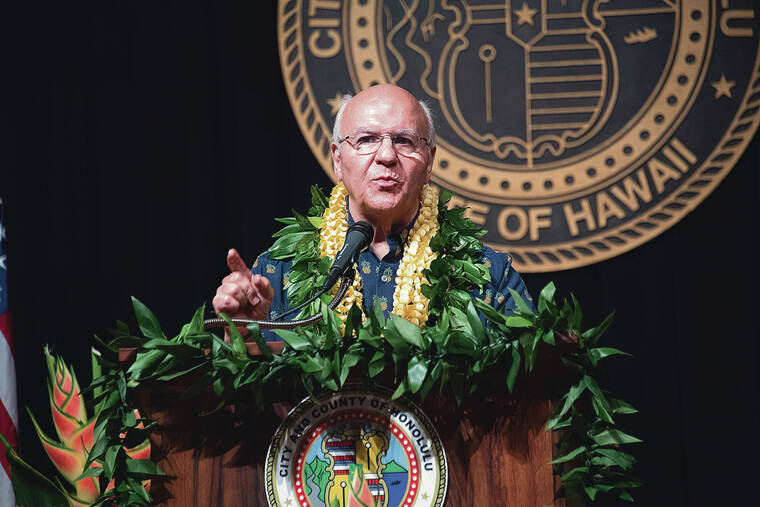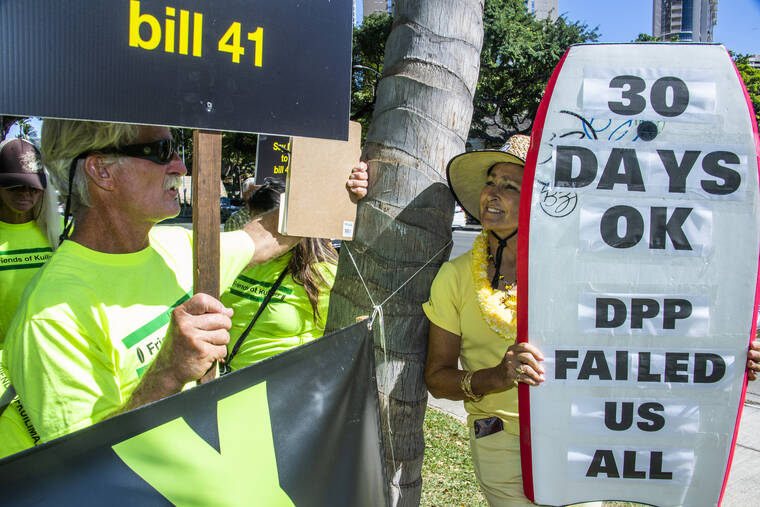Mayor Rick Blangiardi to sign short-term rental bill, return to work after recovering from COVID-19


STAR-ADVERTISER / MARCH 15
Rick Blangiardi:
Honolulu’s mayor will return to work after COVID-19 isolation

CRAIG T. KOJIMA / APRIL 12
Some who are in opposition to Bill 41 — including Harold, left, and Kehoe Holly with the group Friends of Kuilima — hold signs in front of Honolulu Hale.



Mayor Rick Blangiardi said he plans to sign a measure that would tighten rules for short-term rentals on Oahu as he announced he would return to Honolulu Hale today after testing positive for COVID-19 Opens in a new tab last week.
“We’ve said all along, and this was our duty, that we were going to step in and do something about illegal vacation rentals,” he said Monday during a virtual news conference. “We worked very closely and very long on this particular project.”
Bill 41 would change the minimum stay at short-term rentals without a special permit to three months from 30 days.
Short-term rentals would mostly be allowed only in resort-zoned areas in Ko Olina, Kuilima, Makaha and parts of Waikiki. Bill 42 provides exemptions for apartment-zoned areas near resorts and for properties with “nonconforming use certificates” that were granted decades ago and continue in perpetuity regardless of whether the property changes hands.
Other new regulations include registration fees for legal short-term rentals and a ban on on-street parking for vacation rentals in communities zoned as rural, residential or for apartment use.
The Honolulu City Council passed the measure Wednesday in an 8-1 vote, with Council member Andria Tupola voting no.
Don't miss out on what's happening!
Stay in touch with breaking news, as it happens, conveniently in your email inbox. It's FREE!
Although city ordinances normally take effect upon the mayor’s signature, Bill 41 would go into effect 180 days after it is signed. Blangiardi, who did not indicate when he would sign the bill, said he wants to first make sure the Department of Planning and Permitting has enough support for enforcement.
“Our intention is to get this going legally and as quickly as possible,” he said.
Bill 41 is a departure from rules passed in 2019 under Mayor Kirk Caldwell that resulted from a compromise with short-term rental operators and included an enforcement component through a memorandum of understanding with rental platforms such as Expedia and Airbnb.
Blangiardi’s administration never put the agreement into full effect, instead opting to introduce Bill 41.
Airbnb Hawaii policy representative Toral Patel had urged the Department of Planning and Permitting to honor the agreement, which, she wrote in her testimony on Bill 41, has been successful in weeding out illegal vacation rentals on Kauai and Maui.
Expedia Group Government Affairs Senior Manager Richard de Sam Lazaro on Monday said he was disappointed in Blangiardi’s announcement that he would sign the measure.
“In failing to implement existing law and the corresponding agreement Expedia Group signed to assist with enforcement, Honolulu County and its residents are being left without a policy solution that will meaningfully address community concerns,” he said in a statement.
Blangiardi, 75, is expected to return to Honolulu Hale today. He has been isolating at home after testing positive for COVID-19 six days ago.
“I really owe the fact that I got through this the way we did, with really mild symptoms, I owe that to the fact that I had a three-shot regimen,” he said, referring to the initial COVID-19 vaccine series and a booster.
“I think had I not been (vaccinated) — I really don’t want to speculate on that, but I think I probably could have been a lot sicker or really sick, for that matter.”
Blangiardi said he contacted all the people he interacted with the day he started having symptoms, which he described as feeling sluggish followed by light nasal congestion.
No one he contacted has notified him that they contracted the virus, he added.



